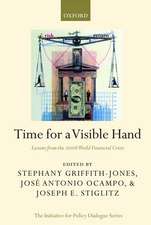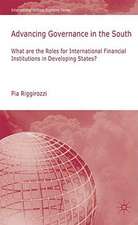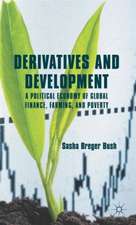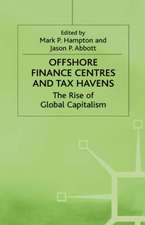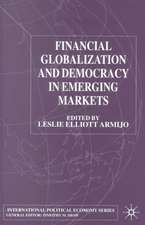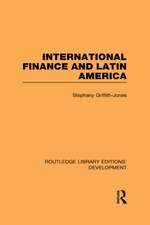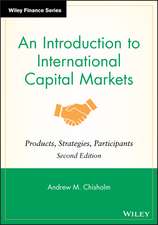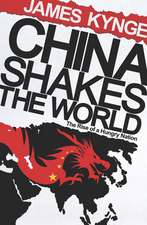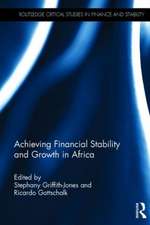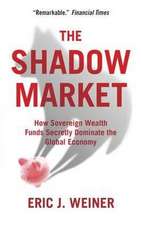Global Capital Flows: Should they be Regulated?
Autor Stephany Griffith-Jonesen Limba Engleză Hardback – 21 sep 1998
Toate formatele și edițiile
| Toate formatele și edițiile | Preț | Express |
|---|---|---|
| Paperback (1) | 635.96 lei 6-8 săpt. | |
| Palgrave Macmillan UK – 1998 | 635.96 lei 6-8 săpt. | |
| Hardback (1) | 640.24 lei 6-8 săpt. | |
| Palgrave Macmillan UK – 21 sep 1998 | 640.24 lei 6-8 săpt. |
Preț: 640.24 lei
Preț vechi: 753.22 lei
-15% Nou
Puncte Express: 960
Preț estimativ în valută:
122.54€ • 132.27$ • 102.75£
122.54€ • 132.27$ • 102.75£
Carte tipărită la comandă
Livrare economică 18 aprilie-02 mai
Preluare comenzi: 021 569.72.76
Specificații
ISBN-13: 9780333726747
ISBN-10: 033372674X
Pagini: 206
Ilustrații: XIX, 206 p.
Dimensiuni: 140 x 216 x 14 mm
Greutate: 0.41 kg
Ediția:1998
Editura: Palgrave Macmillan UK
Colecția Palgrave Macmillan
Locul publicării:London, United Kingdom
ISBN-10: 033372674X
Pagini: 206
Ilustrații: XIX, 206 p.
Dimensiuni: 140 x 216 x 14 mm
Greutate: 0.41 kg
Ediția:1998
Editura: Palgrave Macmillan UK
Colecția Palgrave Macmillan
Locul publicării:London, United Kingdom
Cuprins
Foreword by James Tobin Introduction Systemic Risks and Financial Crises Structure and Composition of Global Flows Sources of Funds Volatility and Criteria of Different Actors for Channelling Flows into and out of Countries Causes and Lessons of the Mexican Peso Crisis Managing Surges of Capital Flows The Regulatory Response to Globalisation of Financial Flows Policy Challenges for Source Countries Bibliography Index
Recenzii
'The fantastic revolution in financial markets of recent decades is still gaining momentum. Thanks to technological miracles of communication and computation, the scope and volume of financial activities rapidly multiply, greatly surpassing the growth of other industries. These developments are encouraged by the dominant trend in political ideology and economic policy throughout the world. Prevailing doctrines foster deregulation and privatisation; they downsize governments and exalt free markets; they stress international trade and investment as against economic nationalism and protectionism. In this book Stephany Griffith-Jones reviews the breathtaking recent history of financial deregulation, liberalisation, and globalization. She sees considerable merit in these trends, at the same time that they can and sometimes do generate volatility and instability that inflict real costs on whole economies. She earnestly seeks some feasible compromises. Those who rush emerging and transition economies into premature currency convertibility and free trade in financial instruments are not doing those countries a favour. After all, during 1947-72, the halcyon quarter century of economic growth, world trade, and international real investment, some major capitalist democracies maintained controls on currency transactions and capital movements. These were not fully dismantled until the 1980s. Experience has not, not yet anyway, vindicated current orthodox confidence that free global financial markets are the keys to stable world wide prosperity. Stephany Griffith-Jones expounds these themes with clarity and conviction, firmly grounded in her thorough knowledge of the theory and practice of the economics of finance.' - James Tobin, Nobel Laureate for Economics
'Griffith-Jones' survey of the theoretical literature behine financial crises is excellent and is recommended for any IPE enthusiast...this survey of world-wide foreign capital flows during the early 1990s will likely be on many international finance-course reading-lists.' - Charles W. Parker, III, Millennium: Journal of International Studies
'Griffith-Jones' survey of the theoretical literature behine financial crises is excellent and is recommended for any IPE enthusiast...this survey of world-wide foreign capital flows during the early 1990s will likely be on many international finance-course reading-lists.' - Charles W. Parker, III, Millennium: Journal of International Studies
Notă biografică
Stephany Griffith-Jones is with the Institute of Development Studies at the University of Sussex.


